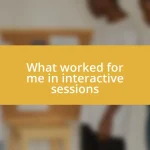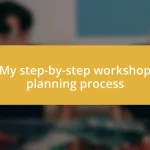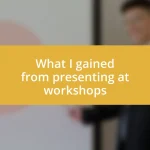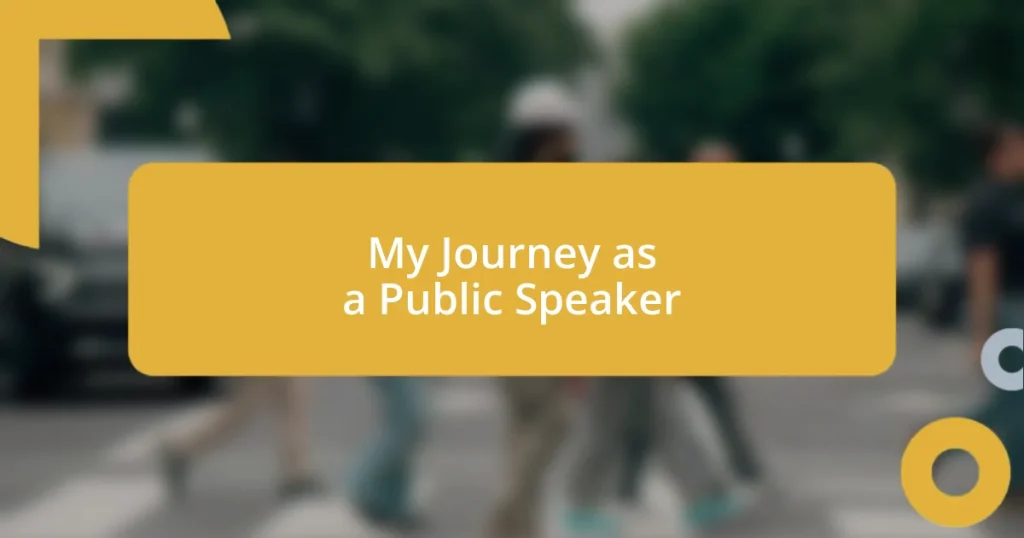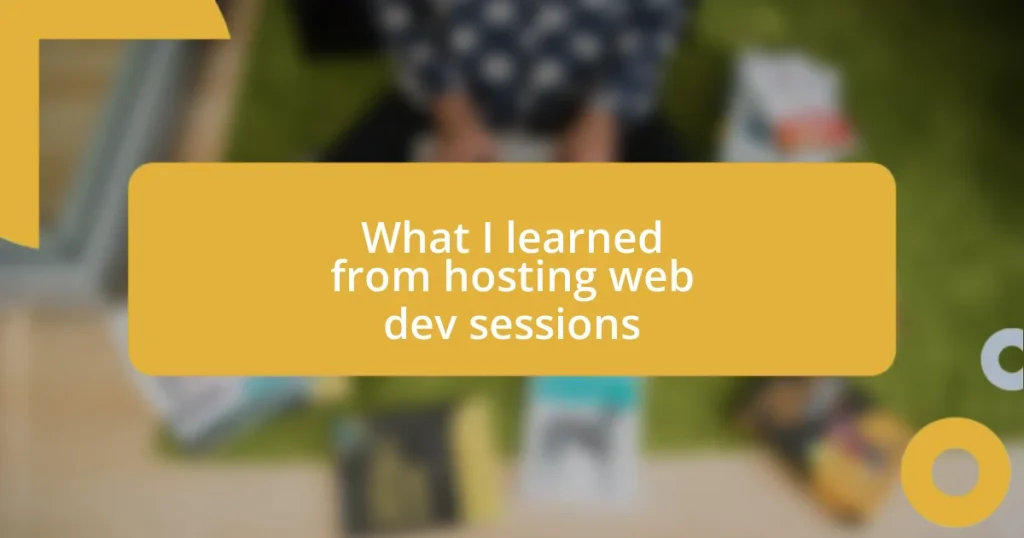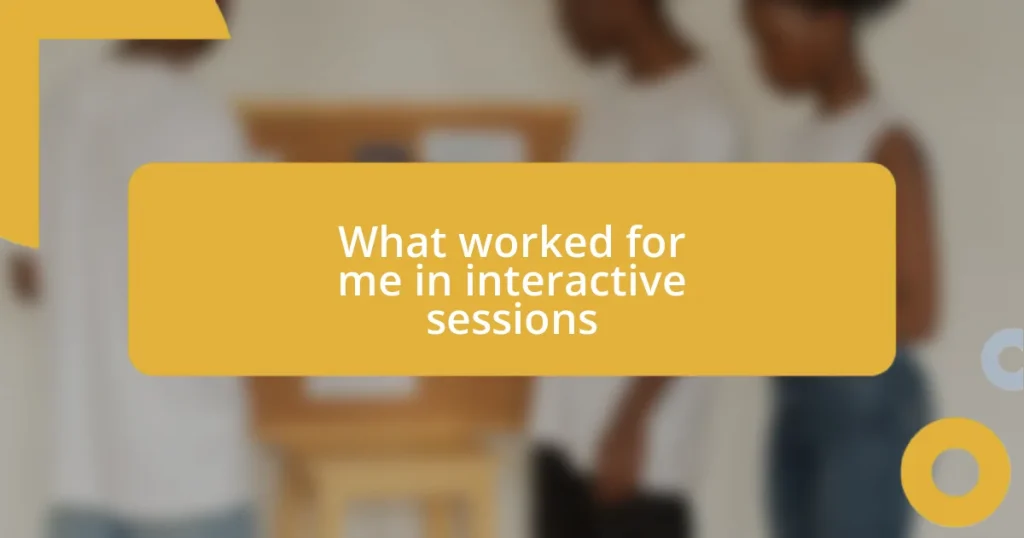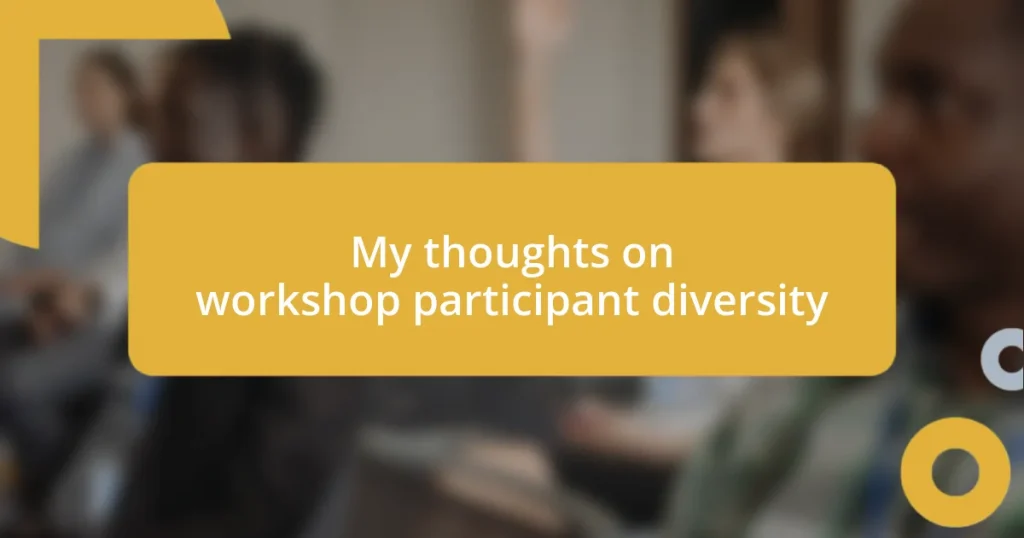Key takeaways:
- Public speaking builds personal growth, confidence, and effective communication through authentic storytelling and audience engagement.
- Identifying and embracing your unique speaking style enhances your authenticity and connection with the audience.
- Continuous improvement through practice, feedback, and introspection is essential for growth and mastering public speaking skills.

Understanding Public Speaking Benefits
Public speaking serves as a powerful platform for personal growth and confidence building. I still remember my first presentation; my heart raced, but the rush of sharing my thoughts with an audience ignited a spark within me. Isn’t it incredible how facing our fears head-on can lead to such transformative moments?
Beyond boosting self-esteem, public speaking fosters connection and allows us to convey our ideas more effectively. I recall a time when I shared a story about overcoming challenges, and the audience’s reactions were so genuine—it felt like we were creating a community right there. Have you ever felt that sense of unity when your words resonate with others? It’s truly a remarkable experience.
Moreover, effective public speaking enhances our leadership skills, which is crucial in today’s collaborative world. In my journey, I’ve discovered that when I speak confidently, I not only engage others but also inspire them to act. What benefits have you seen in your own life from developing this skill? The impact can be profound and far-reaching, both personally and professionally.
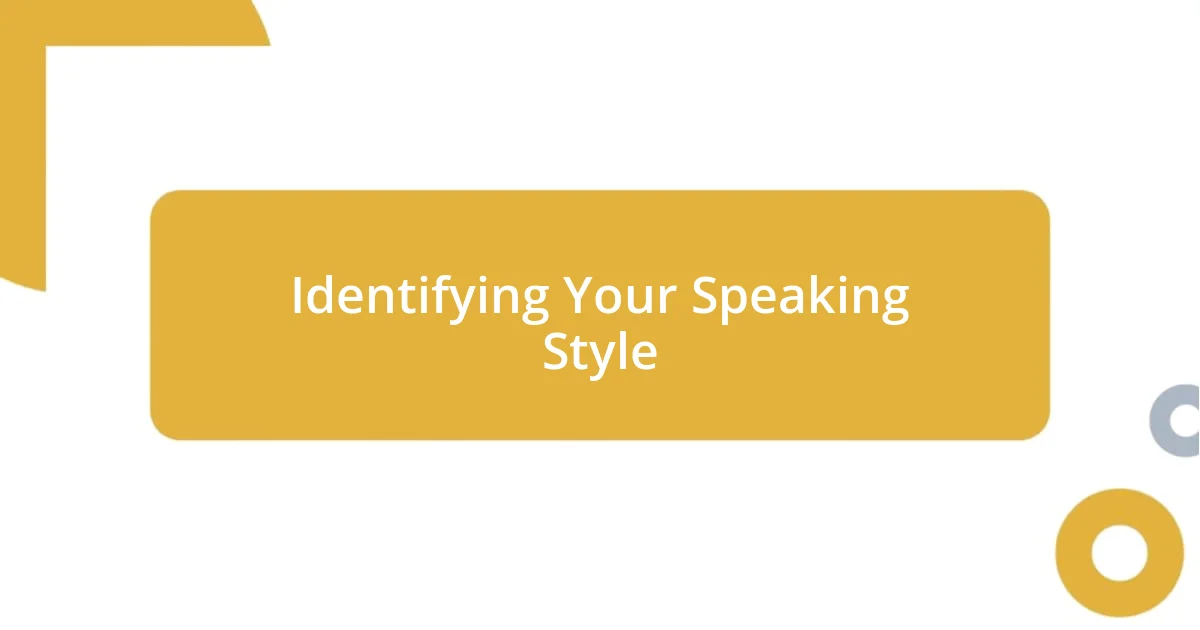
Identifying Your Speaking Style
Identifying your speaking style is essential for becoming an effective public speaker. I initially struggled to find my voice and often imitated others, thinking that was the way to succeed. It wasn’t until I started to embrace my unique quirks—like my penchant for humor and storytelling—that I felt truly authentic on stage. When I let go of the need to fit into a mold, I discovered a style that resonated with both me and my audiences.
To help you determine your speaking style, consider the following:
- Personality: Are you more laid-back and conversational, or do you prefer a formal approach?
- Interactivity: Do you like to engage the audience with questions, or do you prefer a more structured lecture format?
- Content Delivery: Do you naturally weave in stories and anecdotes, or do you focus on data and statistics?
- Emotional Tone: Do you lean towards inspiring and motivational, or do you offer a critical perspective on topics?
- Body Language: Are you animated and expressive, or do you find yourself more grounded and steady?
Reflecting on these aspects can guide you to a speaking style that feels authentic and impactful.
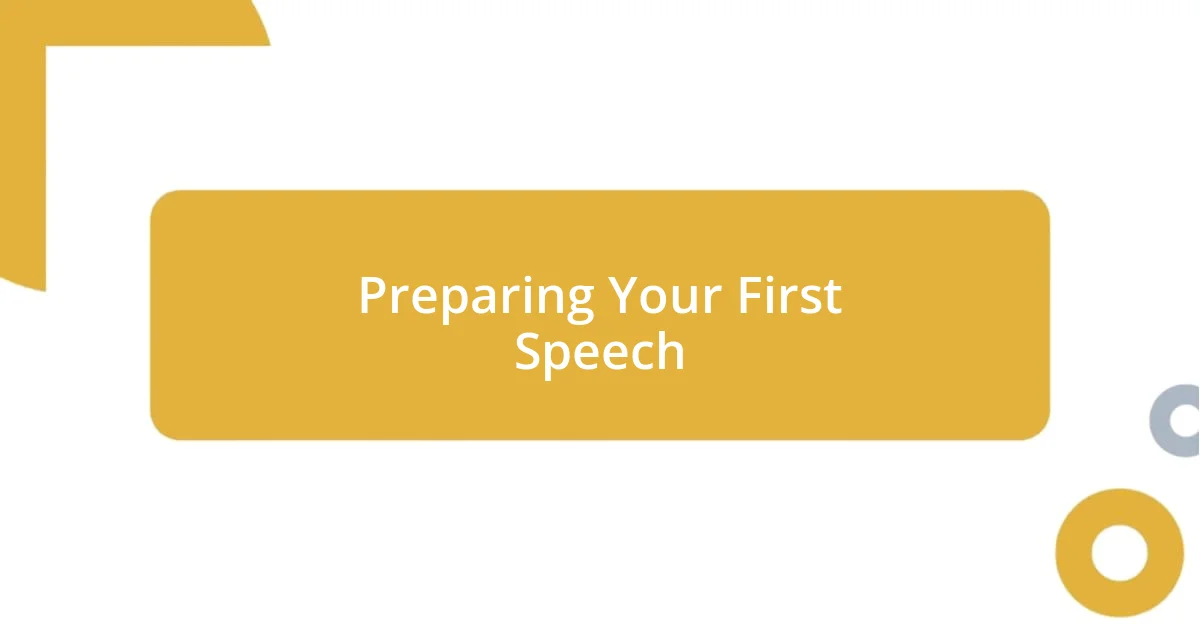
Preparing Your First Speech
Preparing for your first speech can be an exhilarating yet daunting experience. I vividly remember spending countless hours crafting my first speech, juggling excitement and anxiety. Selecting a topic that resonates with you is crucial; it helps to ignite that passion when you stand behind the podium. Have you ever had a moment where the words just flowed because you were talking about something you love? That’s the magic I felt when I shared my journey in public speaking.
Equally important is understanding your audience. I learned early on that tailoring your message to the listener’s interests can make all the difference. I once presented to a group of aspiring young professionals and opted to share practical tips from my own experience rather than theoretical concepts. The response was overwhelmingly positive, and their engagement reassured me that I had connected with them on a personal level. Isn’t it fascinating how knowing who you’re speaking to can shape your message?
Finally, don’t underestimate the power of practice. In my early days, I practiced speeches in front of my mirror, imagining my audience cheering me on. It may sound silly, but those moments built my confidence. I realized that familiarity with your material helps to reduce anxiety. Is there something that you do to prepare that gives you that extra boost? Sharing your insights in a clear, engaging manner can turn nervous energy into effective communication.
| Key Focus | My Experience |
|---|---|
| Choosing a Relevant Topic | Focusing on what excites you makes it easier to communicate authentically. |
| Understanding Your Audience | Tailoring your message ensures that it resonates and engages listeners effectively. |
| Practicing Your Delivery | Repeated practice builds confidence and transforms nerves into impactful performance. |

Overcoming Public Speaking Fear
Overcoming fear in public speaking can feel like climbing a mountain, but I discovered that the summit is within reach. I recall standing backstage, heart racing, drenched in sweat, thinking, “What if they don’t like me?” Then I remembered that everyone in the audience is human, just like me. This perspective shift helped me to breathe a little easier.
Another pivotal moment came when I decided to embrace vulnerability. During one of my early speeches, I shared a personal story about a time I completely bombed a presentation. The audience’s laughter and empathy were unexpected but incredibly powerful. Have you ever felt that cathartic release when you open up? For me, it transformed my anxiety into a connection, reinforcing the idea that sharing our imperfections can actually strengthen our messages.
Lastly, rituals became my secret weapon. Before stepping on stage, I developed a routine: deep breaths, visualization, and a bit of light stretching. I remember the time I quietly whispered affirmations to myself while waiting for my turn to speak; it shifted my mindset from fear to excitement. What are some of the ways you can prepare yourself mentally to counteract that initial anxiety? Finding a personalized routine can not only calm those nerves but also set a positive tone for the journey ahead.

Engaging Your Audience Effectively
One effective way I’ve found to engage my audience is through storytelling. I remember once diving into a gripping tale about a pivotal moment in my career that almost derailed my aspirations. As I saw the audience lean forward in their seats, I realized that this connection through narrative not only captured their attention but also made my message feel more relatable. Have you ever noticed how a good story can draw people in and create an emotional response?
Additionally, incorporating questions into my talks has proven invaluable. Early in my speaking journey, I would pause to ask my audience thought-provoking questions and then share my answers based on my experiences. This interaction not only kept them engaged but also created a dialogue within the room, making everyone feel like they were part of the conversation. Isn’t it thrilling to see eyes light up when they realize their input matters?
Lastly, I’ve learned the importance of body language and presence. During one speech, I took a moment to step down from the stage and engage with the audience directly—something I had rarely done. The energy changed palpably; people began to smile and nod, feeling like they were part of a more intimate setting. Have you considered how your physical presence can enhance your message and foster a deeper connection? Engaging actively with your audience can transform a speech into a memorable experience for everyone involved.

Improving Through Feedback
Feedback has been a cornerstone of my growth as a public speaker. Early on, I remember delivering a talk and getting quite a few puzzled looks from the audience. After the session, a fellow speaker approached me and gently suggested that I clarify a couple of key points. That simple piece of advice opened my eyes to the importance of clear communication. Have you ever received feedback that felt like a lightbulb moment? For me, it was a turning point that changed the way I structured my messages.
I’ve learned to actively seek feedback from various sources, whether it’s from peers, mentors, or even audience members. One time, I asked a close friend to give me a candid review after a speech. She offered constructive criticism, like incorporating more pauses for emphasis. This taught me how valuable fresh perspectives can be. Wouldn’t you agree that sometimes we need an outsider’s view to see our blind spots? Embracing this can lead to breakthroughs that refine our skills.
Moreover, I’ve come to appreciate the emotional aspect of feedback. During a workshop, one participant shared how my story about overcoming challenges resonated with her personal struggles. This heartfelt response reminded me that feedback isn’t just about improving technical skills; it’s also about creating connections. Understanding the impact of my words fuels my passion. How does feedback shape your approach to communicating? It’s a powerful reminder that our messages can touch lives in ways we may never fully realize.

Growing as a Speaker
As I continued on my speaking journey, I discovered that practice truly makes perfect. I vividly recall rehearsing for an important conference, pacing around my living room while I delivered my speech into the air. Each time I stumbled over a word or lost my train of thought, I took a mental note and adjusted. Isn’t it fascinating how repetition builds not just fluency, but confidence? With every run-through, I felt my anxiety dissipate, transforming into a readiness that radiated when I finally took the stage.
Networking with other speakers has also been a game-changer for my growth. I remember attending a workshop where I met an established orator who generously shared her techniques for handling tough crowds. Her anecdotes about facing unexpected challenges resonated with me; I realized that even the most seasoned speakers encounter hurdles. Have you ever thought about how learning from others can shorten your path to mastery? Engaging with different perspectives allows for a richer understanding of the craft, fostering an environment where we can all elevate each other.
Finally, I’ve come to appreciate the power of introspection after each speaking engagement. After one particularly nerve-wracking presentation, I took time alone to reflect deeply on what went well and where I could improve. Journaling about my experiences allowed me to process my emotions, celebrate my victories, and plan for future growth. Have you ever tried journaling your thoughts and feelings after a significant event? It’s remarkable how this practice not only clarifies your path but also helps in solidifying the lessons learned, leading to a more profound evolution as a speaker.

